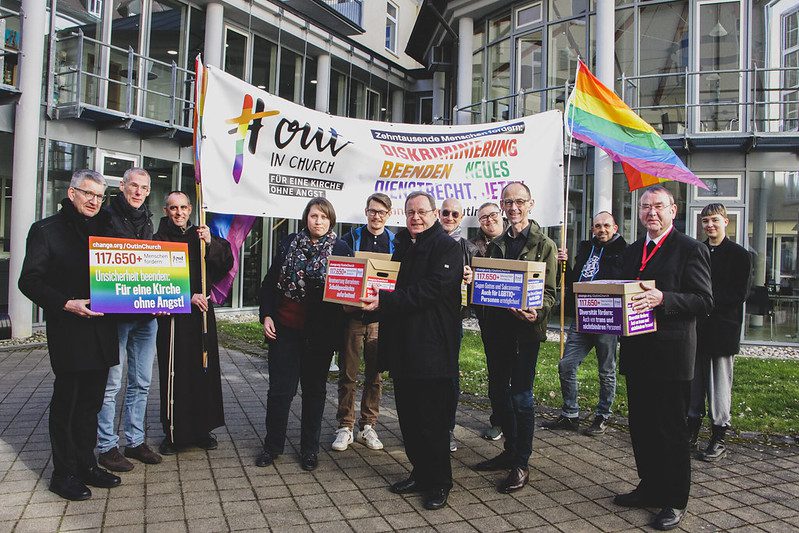
Representatives of the #OutInChurch initiative presenting their manifesto and the petition “OutInChurch—für eine Kirche ohne Angst” to the chairman of the bishops’ conference, Georg Bätzing, on March 9, 2022.
Photo by Change.org/OutInChurch, CC BY-NC 2.0 via Flickr.
In late November, the German Catholic Bishops’ Conference announced that an assembly of diocesan representatives had approved changes to the rules for homosexual Church employees. The news came only days after the German bishops returned from their Ad limina visit to Rome, as Tagesschau reported.
A new edition of the ecclesiastical labour law was passed with a two-thirds majority during a plenary session and provides that employees, who used to be required to agree to the Church’s moral code with regard to relationships and intimacy, are now free to follow their own moral convictions, as these are considered “private matters.” The law applies to some 800,000 lay workers within the Catholic Church in Germany; the Church is, nationwide, the largest employer second only to the government itself.
“The core area of private life, especially relationships and intimacy, are not subject to legal assessment,” the revised law states. The text hails “diversity” as “enrichment” since “all employees can be representatives of God’s unconditional love and thus of a Church that serves the people, regardless of their specific tasks, their origin, their religion, their age, their disability, their gender, their sexual identity, and their way of life.”
Employees with a “sexual identity” contrary to Scripture and Church teaching are asked to “bring a positive attitude and openness toward the message of the Gospel and respect the Christian character of the institution,” as the only qualification.
The labour law (Grundordnung des kirchlichen Dienstes) regulates employees of the Catholic Church and Church-related organizations and differs in provisions from other employers. Historically, it has been based on the so-called right to self-regulation and self-administration in the Weimar Constitution, which later was incorporated into the German Basic Law. This provision was supposed to provide a proper separation of church and state.
The last revision of the law in 2015 included the easing of punishment for civilly divorced and remarried couples, a topic that caused major ripples in the Universal Church around the time of the Synod for the Family 2014.
The law effectively adopts the language of state labour law, neutering Catholic teaching in its fullest sense. With this legal change, the bishops of Germany have voluntarily backed out of the public sphere, succumbing to public and political pressure from the Left and betraying their religious character and mission in the secular state. The change of law is a further deconstructive step along the Synodal Path envisioned by the German bishops.
